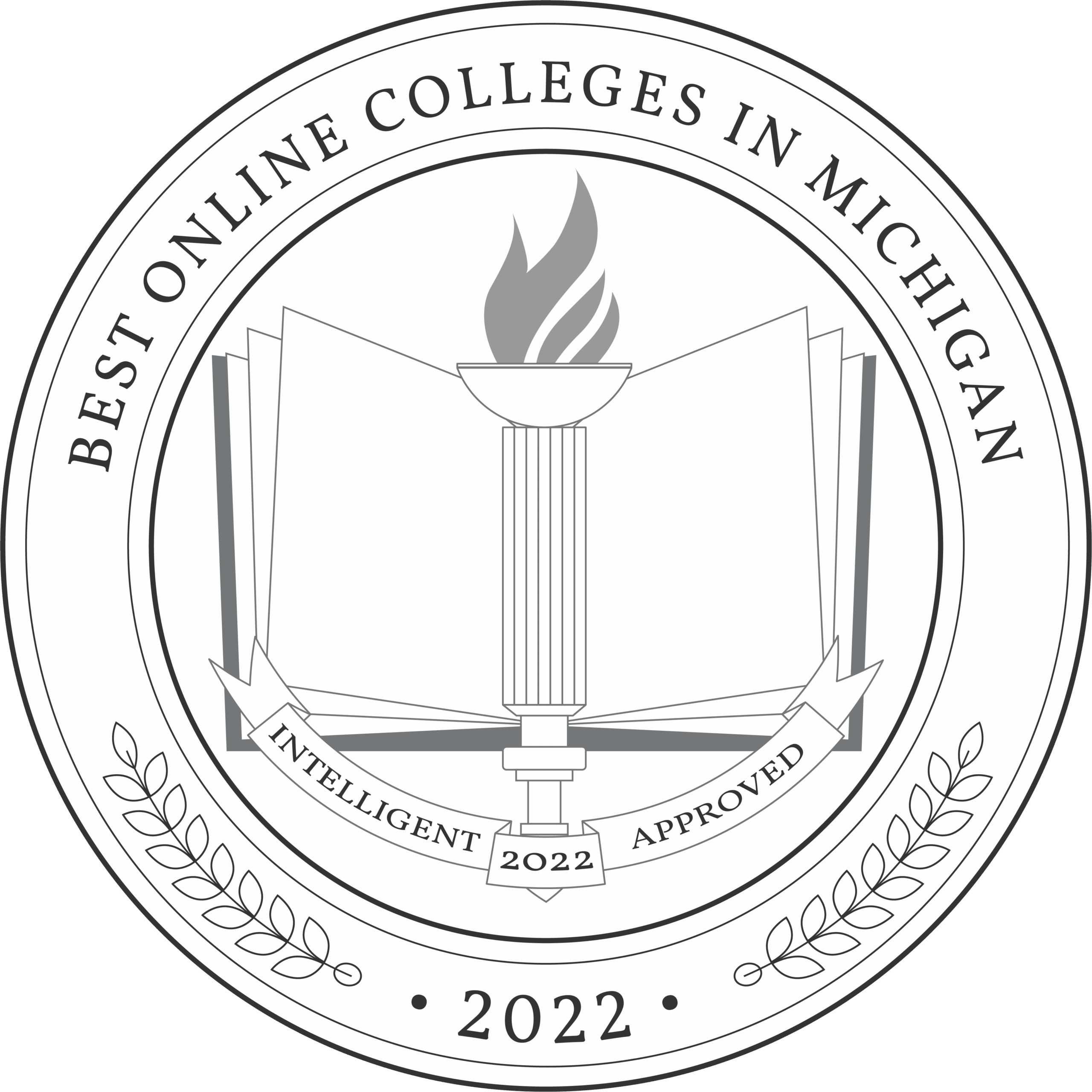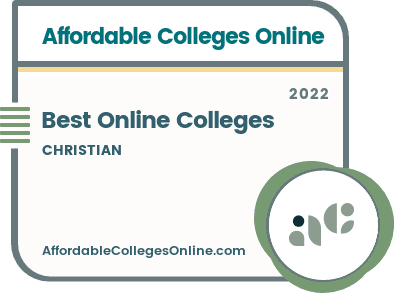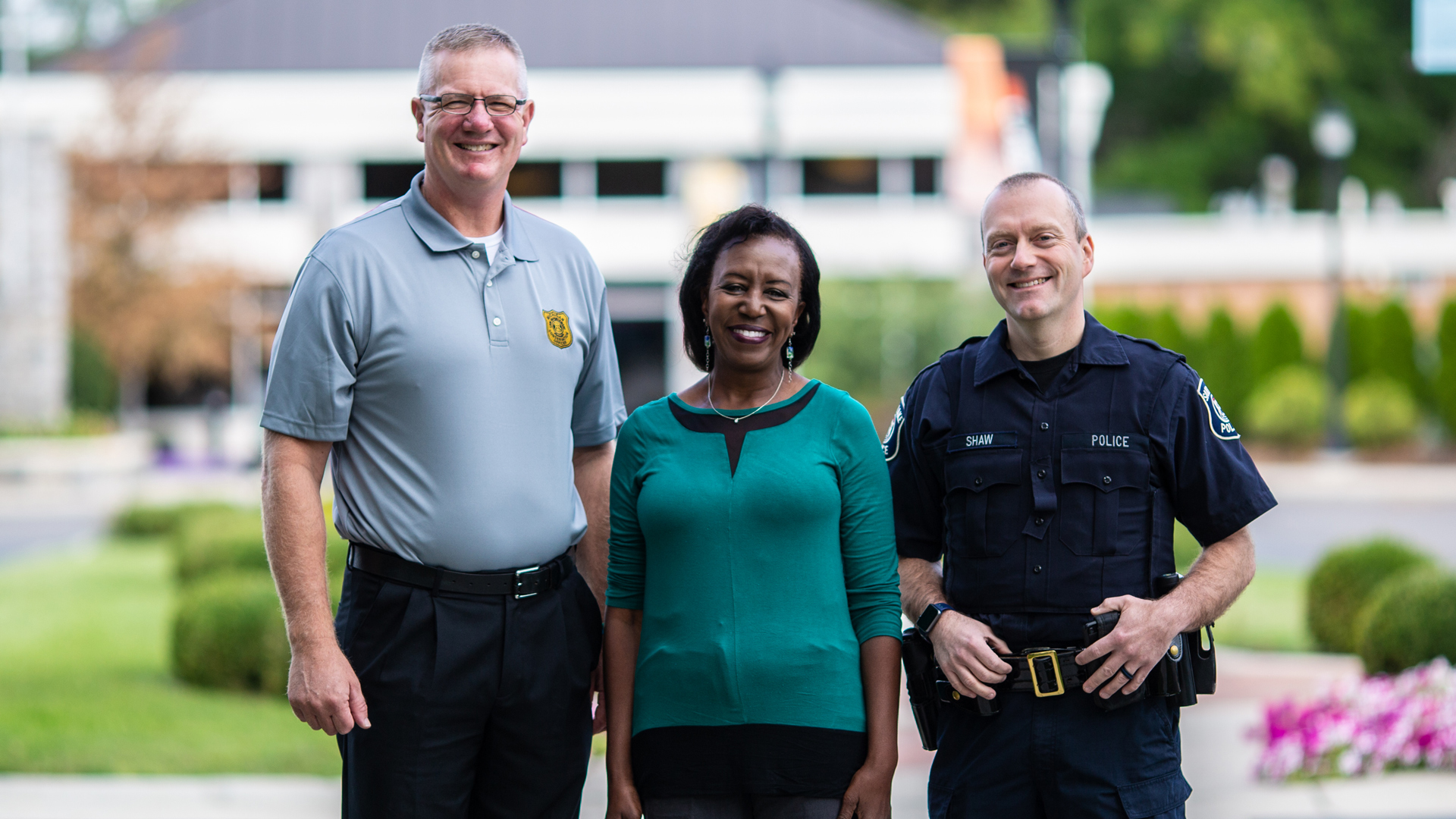Bachelor of Science in
Criminal Justice
The Bachelor of Science in Criminal Justice program will give you a thorough overview of law enforcement and the criminal justice system. Our criminal justice system presents unique challenges to us as Christians. This program is designed to equip students with the skills needed to understand and navigate the complexities of criminal justice with a scriptural foundation. Whether you are interested in a career as a law enforcement officer, a counselor, or anything in between, this program will prepare you to be a courageous ambassador for Christ in the field of criminal justice.
Online Undergraduate Start Dates
September 9, 2025
Discover & Expand Your Calling From Anywhere
With Grace Christian University’s online degrees, you can further your education no matter where you are. Our online programs are designed to help you become equipped for the Lord’s calling on your life, while working through your classes anytime, anywhere.
Grace’s online degrees offer the same, high-quality level of education as our on-campus options. Each degree also includes required Bible and Theology courses. No matter what track you choose, you’ll graduate with a deeper knowledge of God and His Word, prepared to make an eternal impact wherever you go.
Experience an Education with a biblical foundation
Develop Godly Friendships that will last a lifetime
Feel Confident and Prepared for your ministry career
Learn from instructors who really care
What to Expect
Excellence in Criminal Justice, Grounded in Faith
At Grace, our curriculum goes beyond conventional education, weaving biblical principles into every facet of learning. We aim to develop passionate servants of Jesus that emphasize the integration of character transformation, ministry experience, and biblical truth.
2025–26 Tuition Cost
An Affordable Criminal Justice Degree
Explore the pathway to an affordable yet exceptional Criminal Justice degree. With a range of financial aid options and competitive tuition rates, we’re dedicated to ensuring that every student has the opportunity to excel in the pursuit of their calling without the burden of overwhelming student debt.
$470
Online Tuition Cost Per Credit Hour
$250
Online Tuition Cost Per Credit Hour for Military Personnel
(active duty, veterans, spouses, dependents 23 or under)
$0
Online Application Fee
$150
Online Resource Fee per 3-Credit Course
(Covers all textbooks and other resources required for Grace Online students)
48
Months*
120
Credit Hours
5
Week Courses
* Taking one five-week, three-credit course at a time on a year-round rotation, students typically complete 9-10 courses per year. Depending on the student’s transfer credit status, completing the 120-credit B.S. degree generally takes four years.
Career Paths
Criminal Justice Career Paths
Criminal Justice students will be equipped with a versatile skill set that opens doors to a variety of career opportunities. Whether you’re drawn to law enforcement, FBI agent, forensic psychologist, or beyond, the possibilities are vast.
Here are just a few examples of the diverse paths our alumni have pursued after completing their studies:
- Law Enforcement Agent
- Youth Correctional Counselor
- Investigator
- Forensic Psychologist
- Probation Officer
- Parole Officer
- Customs Officer
- FBI Agent
- Investigative Reporter
Criminal Justice Faculty
Our dedicated faculty members are the heart of our Criminal Justice program, embodying qualities of care, mentorship, and a steadfast commitment to Christ-centered education. Each member brings a wealth of professional expertise, ensuring that our students receive top-notch instruction grounded in real-world experience.
Benefits of Our Online Programs
Students in the Online Bachelor’s degree programs:
- Attend classes on a flexible schedule that allows for work and family responsibilities
- Expand career and ministry opportunities with a degree that opens doors
- Obtain an affordable, high-quality education
- Gain collaboration skills through working with classmates and professors
- Achieve an educational goal
Course Descriptions
Criminal Justice Courses
Our Criminal Justice courses equip students with investigative techniques, legal knowledge, and ethical decision-making skills rooted in biblical values, equipping you to become leaders in law enforcement, the justice system, and community service.
The Bachelor of Science in Criminal Justice (120 credit hours) is comprised of:
- Arts and Sciences Core (30 credits)
- Bible and Theology Core (30 credits)*
- Major (48-51 credits)
- Undesignated electives/Minor (9-12 credits total)
- Total required for degree (120 credits)
*18 credits for Degree Completion Transfer Students
Criminal Justice Major
Criminal Justice students will be equipped with a versatile skill set that opens doors to a variety of career opportunities. Whether you're drawn to law enforcement, FBI agent, forensic psychologist, or beyond, the possibilities are vast.
Introduction to Criminal Justice
CJS 251Introduction to Criminal Justice focuses on the various processing stages, practices, and personnel in the criminal justice system. This course examines the problem of crime in American society. Both historical and contemporary components of the system, including the police, the courts, and correctional agencies are explored. This course is designed to provide the student with a foundational, broad-based understanding of both the effects of crime upon communities, as well the criminal justice system response to crime in our contemporary society through the lens of a Christian Worldview. |
3Credit Hours |
Principles of Sociology
SOC 251A study of contemporary Western society with emphasis on culture, socialization, group life, social institutions, social processes and social change. |
3Credit Hours |
Culture and Conflict Management
COM 330Provides a basic overview of conflict resolution. The history, methods, and theory of conflict resolution will be explored. In addition, strategies in competitive versus collaborative negotiation will be examined in the context of culture and a Christian perspective. |
3Credit Hours |
Criminology and Social Deviance
CJS 350Criminology and Social Deviance explores the social and psychological influences on criminal behavior. Current theories that attempt to explain the causes of illegal behavior will be examined, including violent crime, media (video game, TV) influence, gangs, and group deviance, white- collar crime, and ‘victimless’ crime. Attention will be given to understanding criminal behavior as multifactorial within the context of a biblical worldview. |
3Credit Hours |
Criminal Law
CJS 310Reviews criminal law and specific offenses and applies constitutional restrictions on government’s power emphasizing basic criminal law, inchoate crimes, crimes against persons and property, contraband and regulatory offenses, public order crimes, operating while intoxicated, court functions and civil law and process. This course will also explore Biblical expressions of law and applications to modern laws and sanctions. |
3Credit Hours |
Criminal Procedure
CJS 315Focuses on the substantive criminal procedure and on the constitutional restrictions on government’s power to search, seize and question. The course emphasizes basic police criminal procedure, laws of arrest, search and seizure, laws on suspect identification, admissions and confessions, use of force, and other related topics. This course will include an analysis from the Christian worldview of justice and on the topics studied. |
3Credit Hours |
Law Enforcement and Corrections
CJS 330Law Enforcement and Corrections examines the history, policies and laws that impact those working in the criminal justice field. Laws of arrest, evidence, admissions, confessions, search and seizure are highlighted as it guides warrant request and testimony preparation. The history, purposes and organizational structure of jails and prisons are studied. Ethical punishment and treatment are highlighted, with a focus on the legal rights of prisoners and responsibilities of officers. Emphasis is devoted to report writing and the importance of precise record keeping. |
3Credit Hours |
Juvenile Law and Delinquency
CJS 370Juvenile Law and Delinquency focuses on the unique challenges of working with youth within the criminal justice system. Theories that seek to explain juvenile delinquency, including the nature and extent of illegal behavior will be explored, while also considering the significant role of media violence. The justice process for juveniles will be critiqued, highlighting the structure and function of juvenile justice, probation, detention, parole, diversion for child offenders and the roles of family and social institutions in addressing illegal juvenile behavior. A biblical worldview will be promoted in responding to juvenile delinquency. |
3Credit Hours |
Current Issues in Security
CJS 380Current Issues in Security discusses topics related to personal, building, and corporate security. Security knowledge in the workplace is extremely valuable and this course will help students understand the foundations of security and how to defend and react against potential threats. This course will also review legal issues, identifying suspicious behavior, technology in security, personal and structural security, internal and external threats and other related topics. |
3Credit Hours |
Culture, Crime, Ethics and Justice
CJS 440An exploration of the relationships between culture, crime, and social justice with a special emphasis on ethical considerations in light of a biblical worldview. This course seeks to develop the learner’s cultural intelligence and foster compassion and a greater understanding of diverse groups who are affected by the criminal justice system. |
3Credit Hours |
Social Psychology
PSY 325Examines individual behaviors within the context of one’s society. It is a study of how people think about, influence and relate to one another. Components of the behaviors studies in this course include attitudes, beliefs, prejudices, aggression, leadership, altruism, conformity, attraction, persuasion, and stereotypes. |
3Credit Hours |
Survival Psychology
CJS 456Focuses on the traits responsible for surviving in high-stress environments, including responding directly to high-threat encounters. Pro-survival behaviors are presented, including the “gift of fear” and balancing independence and leadership versus the need for teamwork collaboration in responding to stressful events. Organizational and professional psychological traits present in law enforcement, paramilitary organizations and high stress organizations are explored, as well as healthy lifestyle factors that lead to career effectiveness and avoiding burnout, such as managing vicarious trauma and promoting self-care. |
3Credit Hours |
Research Statistics
PSY 282An introduction to research methodology and statistics as a liberal arts discipline, this course will not primarily be a number crunching course, though many statistical concepts will be presented in context. The emphasis of the course will be on developing an understanding of the principles and concepts underlying the use of statistics in social sciences research and applications. Topics to be explored include the formulation of questions and hypotheses, appropriate experimental design, sampling methodology, data analysis, and the presentation of results using graphical summaries and proper statistical notation. Offered alternate years. |
3Credit Hours |
Capstone
CAP 498Program Capstone |
3Credit Hours |
Arts & Sciences Core
Our Arts and Sciences Core curriculum is designed to cultivate holistic learning outcomes of human understanding, self understanding, and relational understanding. Through a diverse array of courses and interdisciplinary exploration, students delve into a variety of subjects, fostering a deeper appreciation for the world around them while honing essential skills for personal and professional growth.
Introduction to Online Studies
GEN 111Focuses on the foundational knowledge, basic software skills, and motivation required to succeed 1n the digital classroom and as a follower of Christ. Through various educational experiences, students will learn about self and others, and how the Body of Christ works together to impact the world for His glory. Students will gain an understanding of university systems, vision, and mission. This course will begin preparing students to make an eternal impact wherever they go while on a successful fulfilling path to graduation. |
3Credit Hours |
Introduction to College Writing
ENG 105Writing is an important skill for academic, ministry, and vocational success. This course focuses on developing writing skills, providing students opportunities to break down the writing process. Students will learn how to create strong thesis statements to drive an academic paper. They will learn how to craft introductory and concluding paragraphs, build the body of a paper, consider their audience, and improve writing skills to communicate more effectively. They will develop basic skills in APA formatting and citations. Students will also work on refreshing grammar skills. Must be completed with a grade of C- or higher. |
3Credit Hours |
Life Communication
COM 140Life Communication prompts students to identify their passion and excitement to use the gift of speech for good. By working through the process of topic selection, research, and speech organization, students will build confidence in serving others with their communication. In Life Communication, students will be encouraged to know their story, challenged to live their story, and empowered to tell their story. |
3Credit Hours |
Professional Communication
COM 290Explores the fundamental concepts, principles, and skills needed for effective communication in a global world. Emphasis will be given to communication concepts, skillful writing, professional interviewing, organized informational presentations, and cultural intelligence in the workplace. Prerequisite: ENG 101, COM 140 |
3Credit Hours |
College Writing and Research
ENG 300Students will learn the importance of using credible sources and building strong arguments. Students will develop thesis statements, introductions and conclusions, consider audience and purpose, and integrate credible and scholarly sources using APA formatting. They will develop writing skills to help in academic courses, business pursuits, ministry, as well as other career positions. |
3Credit Hours |
World Civilizations
HST 231Provides students with skills in historical research and analysis, a chronological understanding and factual knowledge spanning from the dawn of civilization to 1700. Emphasis is placed on the origins and achievements of the core civilizations of Asia, Africa, America, and Greco– Roman civilizations. In addition, Christian, Islamic and Byzantine cultures will be studied. The ultimate focus will be to provide students with a historical, factual, cultural, and geographical knowledge of ancient history and its relationship to the Bible. Upon completion, students should be able to analyze significant political, socioeconomic, and cultural developments up to the early modern world civilizations within the interrelations of societies and cultures. |
3Credit Hours |
Philosophy and Worldview
PHL 133Addresses the fact that our culture is confronted with a vast assortment of differing philosophies and worldviews; each claiming to be true. Focus is provided to understand and evaluate these various belief systems in an increasingly pluralistic society. Main ideas of eight different worldviews will be explored while the student develops and expresses a personal worldview. Topics will center around the nature of God, reality, nature of man, death, truth, morality, and the meaning of life. The primary purpose of this course is to challenge students to examine the timeless truths of Christianity. |
3Credit Hours |
Introduction to Cultural Diversity
SOC 243An exploration of cultural diversity and multiculturalism from a Christian faith perspective. This course provides a process to understand and practice cultural diversity competence. It is designed to initiate and provide ongoing preparation for effective interaction with everyone in our culturally diverse world. Growth in these skills equips individuals with the social graces needed to form bonds of mutual trust that will bridge the differences that ordinarily divides people. |
3Credit Hours |
Environmental Science
SCI 220Provides a general understanding of environmental science, while exploring the natural world and the resources it provides. The study of environmental science is approached with an understanding of the responsibilities of human beings to practice wise stewardship of God’s creation. Topics include, but are not limited to, exploration of environmental issues, the relations between living and nonliving things, human responsibility for the environment and the earth’s resources now and in the future. |
3Credit Hours |
Arts and Sciences Electives
—Choose an Arts and Sciences Elective. See the Online Undergraduate Academic Catalog for details.
|
3Credit Hours |
Bible & Theology Core
Our Bible and Theology Core curriculum is designed to provide students with opportunities for spiritual growth, ministry, and biblical literacy. Delve into learning to analyze biblical texts, engaging in service, and practicing spiritual disciplines.
Old Testament Survey
BIB 141A survey of Old Testament literature in its historical setting. Attention is given to outstanding persons, events, and theological emphases. |
3Credit Hours |
New Testament Survey
BIB 143A survey of New Testament literature including a study of its historical settings, literary type, and main theological themes. Attention will also be given to outstanding persons, events, and major teachings. |
3Credit Hours |
Introduction to Dispensational Theology
THE 254Provides an overview of the basic tenets of Dispensational Theology. Included is a study of foundational passages in the Bible, a review of the historical development, as well as how a dispensational perspective shapes the study of Scripture. Special consideration will be given to the mid–Acts dispensational views of Grace Christian University. |
3Credit Hours |
Christian Theology I
THE 256A survey of foundational doctrines of systematic theology including Bibliology, Theology Proper (God), Christology (Christ) and Pneumatology (Holy Spirit). It will include an overview of the midActs dispensational perspective of theology held by the institution. The course also encourages the practical integration of these doctrines in the life and service of the Christian. |
3Credit Hours |
Letters of Paul
BIB 442Examines the background and ministry of Paul, as well as the origin and purpose of each of the Pauline epistles in the context of the development of his ministry. The study will include an analysis and synthesis of major Pauline themes, including the Pauline concept of the church and its mission. |
3Credit Hours |
Organizational Leadership
LEA/BUS 372Provides an understanding of the topic of leadership in four contexts: intrapersonal and interpersonal relationships, organizational structure, processes, and culture within organizations. Includes study of organizational leadership from a theoretical, practical and biblical point of view. |
3Credit Hours |
Spiritual Formation
MIN 370Emphasizes the practical outworking of the Holy Spirit in the life of the believer. Special consideration will be given to how the Holy Spirit equips God’s people for service, a development of a plan for lifelong spiritual growth, and appreciation for and practice of the historic spiritual disciplines. |
3Credit Hours |
Knowing God
THE 454Provides an in–depth study of Theology Proper, the study of God the Father. Included with this will be understanding the Trinity doctrine, with an emphasis on biblical, historical and theological dimensions of knowing God as the Father, Son and Holy Spirit. |
3Credit Hours |
Christian Ethics
THE 332Lays the foundation for a Christian response to ethical issues arising in 21st Century Western culture. Attention is given to the biblical foundation of Christian personal and social ethics, the history of ethics, ethical decision–making, and personal character development. Application of these topics will be made to a range of contemporary issues. |
3Credit Hours |
Christian Theology II
THE 453An in–depth study of the doctrines of systematic theology, including Anthropology (Man), Hamartiology (Sin), Soteriology (Salvation and the Atonement), Angelology (Angels), Ecclesiology (Church) and Eschatology (End Times). These doctrines will be considered from the mid–Acts dispensational view of theology held by Grace Christian University. The course also encourages the practical integration of these doctrines in the life and service of the Christian. |
3Credit Hours |
Online Elective Track Options
An elective track is a group of four courses grouped together based on a single topic. Students may select a single elective track or select four individual electives. The strategic choice of electives allows the student to tailor a selected degree to their personal or career pursuits or to explore topics of interest.
Testimonials
What Our Students Are Saying
We believe education is more than just academics. Check out firsthand accounts from students like you who have been impacted by our vibrant community, transformative education, and unwavering commitment to faith.




Frequently Asked Questions
Who is the Bachelor's Program for?
Anyone who has a high school diploma or equivalent and is seeking a quality Christian education. We offer tuition discounts for military personnel and payment plans for cash paying students. We also accept Federal Financial Aid.
What is the Grace Christian University Difference?
Academic Rigor
The program will teach and develop graduate-level research, writing, critical thinking, leadership and communication skills. Beginning with the Program Seminar, the program is designed to acclimate students to graduate-level work and prepare them for the kind of reading, writing, and thinking skills they will need for the remainder of the program.
Student-Centered
The application of constructivist learning theory puts the responsibility of learning in the hands of the students. Whenever possible, students will be allowed to choose what they will learn, how they will learn, and how they will assess their learning in terms of their ministry and professional goals.
Best Practices
As a fully online program, Graduate Studies at Grace Christian University adheres to the best practices of online education, including, but not limited to: online presence, creating a supportive online community, a variety of individual, small group, and large group learning experiences, and clear communication in the online environment.
What Can I Expect from the Professors of this Program?
Your professors have first hand knowledge working in their areas of instruction, along with advanced degrees and higher education experience. They are eager not just to instruct, but to guide you on your faith journey and pray for you throughout your time here. Their desire is to help you succeed and equip you for where God has called you.
What are the Benefits of the Program?
Students in the Online Bachelor's programs will be able to:
-
Attend classes on a flexible schedule that allows for work and family responsibilities
-
Expand career and ministry opportunities with a degree that opens doors
-
Obtain an affordable, high-quality education
-
Gain collaboration skills through working with classmates and professors
-
Achieve an educational goal
What Flexibility Does the Bachelor’s Program Offer?
Students can work on one course at a time, at a time of day and week that is convenient for them.
Why Should I Study Online at Grace?
Advance your career from the comfort of your own home.
Our online master’s degrees are designed for busy professionals who desire to advance their careers. Through our flexible classes, our professors will encourage and mentor you as you expand your current pursuits.
Experience a caring community.
Connect with professors and students who will come alongside you as you pursue higher education and growth in Christ. At Grace, we’re passionate about equipping and supporting you to serve the Lord and others in all that God has called you to do.
Strengthen your biblical foundation.
At Grace Christian University, the Word of God is taught, valued, and celebrated. Deepen your knowledge of God’s Word as you receive an education grounded in objective Biblical truth.
The Grace Experience.
As closely as possible, the Graduate Studies program will reproduce the experience of undergraduate students (On Campus and Online) in an authentic Grace Christian University experience, expressing the ethos, core values, and historic mission of the University. This includes the University’s commitment to being a Bible-centered institution, committed to our historic Grace theological position, which values transformative relationships and service to church and society.
What Sets Our Bachelor's Programs Apart?
Our Enrollment Advisors are there for you.
One-on-one coaching through the admissions process and the first class with your assigned Enrollment Advisor. Your advisor will want to know:
- Your passion
- Your path and goals
- Life circumstances that could help or hinder your success
- How can they pray for and with you
Your advisor will take this information seriously and provide tailored care as you get started with your degree.
We Prioritize You
Your goals and giftings are prioritized so they drive your success; this is opposed to a one-size fits all mentality & communication.
We take care of all class registration and your personalized education plan is created when you begin your program, so you are able to see all courses required until your graduate date.
One Class at a Time
No required log-in time (you log in throughout the week when it works best for your schedule!)
Students finish their online degrees in the same period as if they were attending an on-campus program.
Our Professors Care
Staff and faculty care about each student's eternal impact, which influences the care and resources we provide. Professors care and are easily accessible.
Low professor-to-student ratio:
- Online Undergraduate - 9.3 students per course section
- Online Graduate - 7 students per course section
The Bible is Central
All classes are taught from a biblical foundation, regardless of subject, with weekly devotions.
Low Cost Quality Education
Low tuition for a private Christian education.





Take the Next Step
Your Calling to the World Awaits
Join the Grace community and embark on a transformative journey of faith, learning, and personal growth as you pursue your calling in the criminal justice field.










